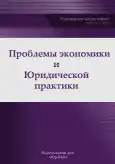Assessment of Financial Stability and Independence in the Audit of Management Effectiveness
- Authors: Kashirskaya L.V.1, Perepechkina E.G.2
-
Affiliations:
- FGOBU VO «Financial University under the Government of the Russian Federation»
- Astrakhan State University
- Issue: Vol 18, No 1 (2022)
- Pages: 212-217
- Section: Articles
- URL: https://journal-vniispk.ru/2541-8025/article/view/147411
- ID: 147411
Cite item
Abstract
Full Text
##article.viewOnOriginalSite##About the authors
Liudmila V. Kashirskaya
FGOBU VO «Financial University under the Government of the Russian Federation»
Email: kashirskaya76@mail.ru
Dr. Sci. (Econ.), Associate Professor; professor of the Audit and Corporate Reporting Department Moscow, Russian Federation
Elena G. Perepechkina
Astrakhan State University
Email: econ-help@mail.ru
Cand. Sci. (Econ.), associate professor of the Department of State and Municipal Management Astrakhan, Russian Federation
References
- Ananyina V. Coefficients of financial independence of the enterprise. Formulas. Calculation [Electronic resource]. URL: https://finzz.ru/koefficienty-finansovoj-nezavisimosti-predpriyatiya-formuly-raschet.html.
- Bystrov O.F. Theory of management. Monograph. / O.F. Bystrov, D.E. Tarasov -Moscow: Rusains, 2020. -182 p.
- External financial audit: how it can be useful for the organization [Electronic resource]. URL: https://rdv-it.ru/company/press-center/blog/vneshnii-finansovyy-audit/.
- Vorobyev A. E., Chekushina T. V. National economic security of Russia. Methodology of Public debt management: monograph; Publishing House of the Peoples' Friendship University of Russia -Moscow, 2021. -420 p.
- Genkin B. M. Motivation and organization of effective work (theory and practice): monograph / B. M. Genkin. -2nd ed., ispr. -Moscow: Norma: INFRA-M, 2020. -352 p.
- Grigorieva E. A. Institutional support of economic modernization as a condition of economic security: Monograph; INFRA-M -M., 2020. -241 p.
- Sidilev S. Step-by-step instructions on financial analysis of the company [Electronic resource]. URL: https://bcs-express.ru/novosti-i-analitika/poshagovaia-instruktsiia-po-analizu-kompanii.
- Suglobov A.E., Chernov P.L. Basic approaches to identifying signs of bankruptcy of a commercial organization during economic expertise. Bulletin of Economic Security. 2015. No. 5. pp. 128-132.
Supplementary files








